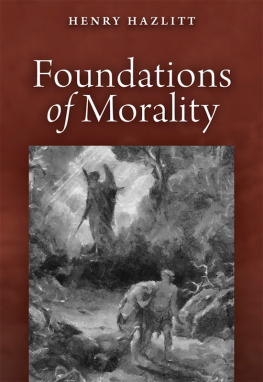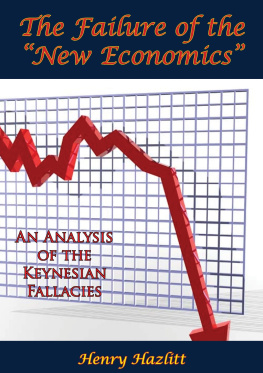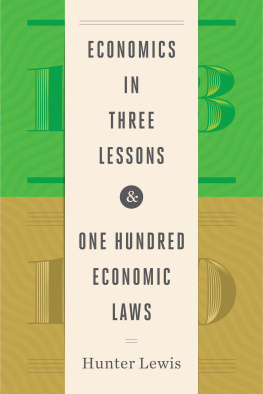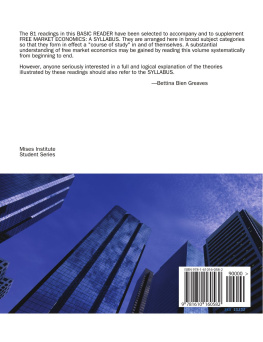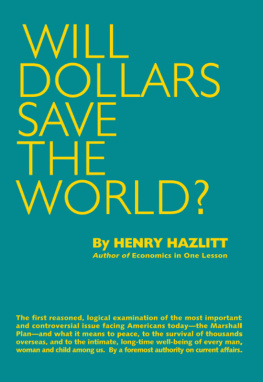THE
FOUNDATIONS
OF
MORALITY
THE
FOUNDATIONS
OF
MORALITY
by HENRY HAZLITT
The Foundation for Economic Education
Irvington-on-Hudson, New York 10533

Henry Hazlitt (18941993)
Henry Hazlitts distinguished career began in 1913 when he was hired by The Wall Street Journal. He went on to write for several newspapers, including The New York Evening Post, The New York Evening Mail. The New York Herald, and The Sun. In the early 1930s he was literary editor of The Nation, and succeeded H.L. Mencken as editor of the American Mercury in 1933. From 1934 to 1946 he served on the editorial staff of The New York Times. While at The Times, he wrote a series of courageous editorials opposing the trend toward radical intervention by all levels of government. From 1946 to 1966 he was the Business Tides columnist for Newsweek.
Mr. Hazlitt will be remembered as an eloquent writer, an incisive economic thinker, and a tireless defender of freedom. His best known book was Economics in One Lesson, which has sold more than one million copies since its first publication in 1946. He wrote or edited seventeen other books, including The Failure of the New Economics (1959) and The Foundations of Morality (1964). He was a Founding Trustee of The Foundation for Economic Education.
Originally published 1964 by D. Van Nostrand Company, Inc.
Library of Congress Catalog Card Number 72-81850
ISBN 1-57246-007-5
Hazlitt Centennial Edition Copyright 1994
The Foundation for Economic Education, Inc.
Irvington-on-Hudson, New York 10533
Copyright 1994
To preach morality is easy,
to give it a foundation is hard.
ARTHUR SCHOPENHAUER
Preface
It would be enormously presumptuous for any writer, in a subject that has engaged the earnest attention of the worlds greatest minds over twenty-five centuries, to claim very much originality. Such a claim would, moreover, probably be more presumptuous in ethics than in any other subject; for as I point out in my Introduction, any ethical system that proposed a transvaluation of all (traditional) values would be almost certainly wrong.
Yet progress in ethics is none the less possible, and for the same reasons that it is possible and has been achieved in other branches of knowledge and thought. A dwarf sees farther than a giant can, if he stands on the giants shoulders. Because we stand on the shoulders of our great predecessors, and have the benefit of their insights and solutions, it is not unreasonable to hope that we can formulate more satisfactory answers to at least a few questions in ethics than the answers they were able to find. This progress is most likely to consist in achieving greater clarity, precision, logical rigor, unification, and integration with other disciplines.
I was myself originally led to write the present book by the conviction that modern economics had worked out answers to the problems of individual and social value of which most contemporary moral philosophers still seem quite unaware. These answers not only throw great light on some of the central problems of ethics, but enable us to make a better analysis of the comparative moral merits of capitalism, socialism, and communism than ethical specialists have hitherto been able to offer.
After I decided to write this book, however, and began to think and read more about the problems of ethics, I became increasingly impressed with the enormous amount, also, that ethical theory had to learn from what had already been discovered in jurisprudence. It is true not merely that law enforces a minimum ethics, that law is a circle with the same center as moral philosophy, but with a smaller circumference. It is true also that jurisprudence has worked out methods and principles for solving legal problems that can be extremely illuminating when applied to ethical problems. The legal point of view leads, among other things, to explicit recognition of the immense importance of acting in strict accordance with established general rules. I have sought here to present a unified theory of law, morals, and manners.
Finally I was increasingly struck by the falsity of the antithesis so commonly drawn by moral philosophers between the interests of the individual and the interests of society. When the rightly understood interests of the individual are considered in the long run, they are found to be in harmony with and to coincide (almost if not quite to the point of identity) with the long-run interests of society. And to recognize this leads us to recognize conduciveness to social cooperation as the great criterion of the Tightness of actions, because voluntary social cooperation is the great means for the attainment not only of our collective but of nearly all our individual ends.
On the negative side, I have been depressed by the excessive preoccupation of most of the serious ethical literature of the last thirty and even sixty years (if we begin with G. E. Moores Principia Ethica) with purely linguistic analysis. I have touched on this (in Sections 7 and 8 of Chapter 23) only enough to point out why most of this hair-splitting and logomachy is a digression from the true business of ethics.
In a field that has been furrowed as often as ethics, ones intellectual indebtedness to previous writers must be so extensive as to make specific acknowledgment seem haphazard and arbitrary. But the older writers from whom I have learned most are the British Utilitarians beginning with Hume, and running through Adam Smith, Bentham, Mill, and Sidgwick. And the greatest of these is Hume, whose insistence on the utility of acting strictly in accordance with general rules was so strangely overlooked by nearly all of his classical Utilitarian successors. Much of what is best in both Adam Smith and Bentham seems little more than an elaboration of ideas first clearly stated by Hume.
My greatest indebtedness to a living writer (as I think will be evident from my specific quotations from his works) is to Ludwig von Miseswhose ethical observations, unfortunately, have not been developed at length but appear as brief incidental passages in his great contributions to economics and praxeology. Among contemporary moral philosophers I have learned much, even when I disagreed with them, from Sir David Ross, Stephen Toulmin, A. C. Ewing, Kurt Baier, Richard B. Brandt, J. O. Urmson, and John Hospers. And in tracing the relations between law and ethics, my chief sources have been Roscoe Pound, Sir Paul Vinogradoff, and F. A. Hayek.
I am deeply indebted both to Professor von Mises and Professor Hospers (in addition to the help I have received from their writings) for kindly reading my manuscript and offering their criticisms and suggestions. Whatever the defects of my book may still be, and however much I may have fallen short of appreciating the full force of some of their criticisms, or of making adequate correction, I am sure this is a much better book than it would have been without their generous help.
A question that may occur to some readers at the very beginning, and must haunt many a writer on ethics at some time during the course of his study and composition, is: What is the use of moral philosophy? A man may know what is right and still fail to do it. He may know that an action is wrong and still lack the strength of will to refrain. I can only offer for ethical theory the defense offered by John Stuart Mill in his Autobiography for the usefulness of his System of Logic, that whatever may be the practical value of a true philosophy of these matters, it is hardly possible to exaggerate the mischiefs of a false one.
Next page
